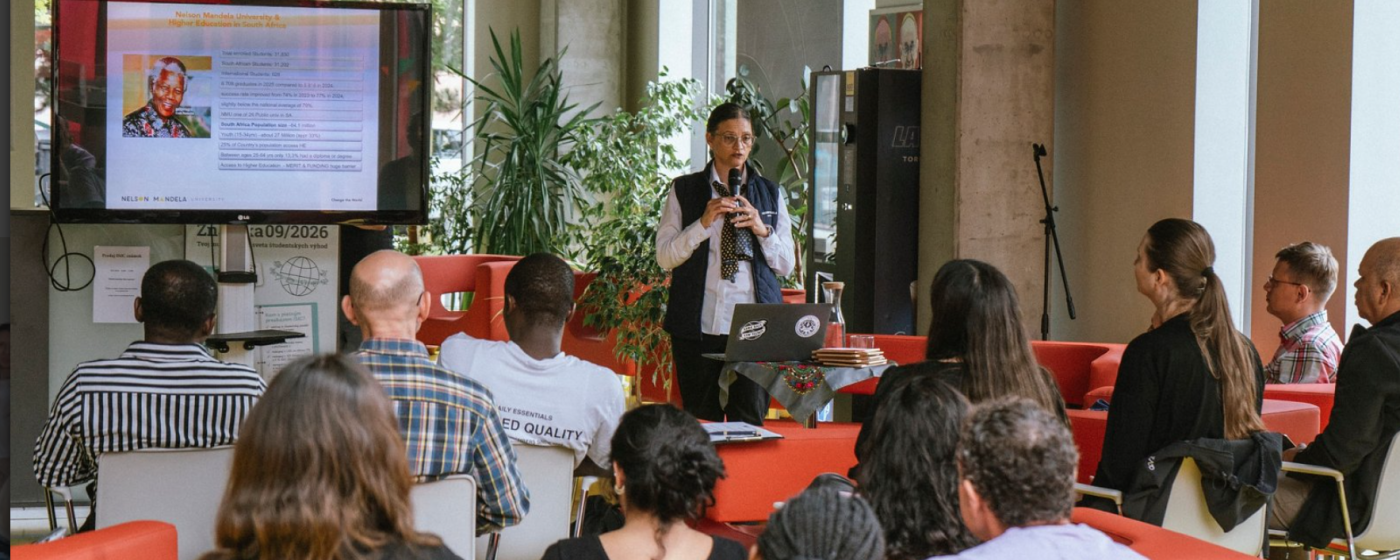On the contrasts between South Africa and Slovakia

In her academic and research activities, she focuses primarily on the prevention and treatment of addiction and youth and family issues, as well as topics related to cultural sensitivity and competence in social work and psychological practice. Her publications often address issues such as parents of children in conflict with the law, the importance of community-led support groups, and intercultural communication in healthcare settings.
Dr Goliath thus combines expertise in social work and psychology with a practical emphasis on the cultural context and social challenges that are characteristic of the South African environment. Her work contributes to the development of sensitive and effective approaches to social work, reflecting the need to support vulnerable groups, families, and communities in a changing social environment.
Veonna participates in teaching mobility under the Erasmus+ KA171 programme as a representative of the Department of Internationalisation at Nelson Mandela University, where she also serves as a contact person for professional practice. Her mobility included lecturing at the Department of Social Work. In addition, she visited agencies to assess their suitability for a practical internship programme for two social work students as part of the student mobility programme (planned for the winter semester of 2026/2027). Her presence was also used as part of informal meetings with KU employees and students in Ružomberok, during which there was an opportunity to meet interesting guests and discuss current topics. In Veonna's case, the topic was "Wellness Enhancement: Altering Transactional Patterns and Personal Management.". We will address the issue of improving our quality of life by examining how people manage themselves (personal management) and how they communicate with others (transactional patterns).
As Veonna states, "PaedDr Martin Pinkoš, the international relations officer, provided me with tremendous support. His thorough preparation of all the necessary documents, clear and consistent communication, and facilitation of communication between me and the Department of Social Work at the host university were invaluable. I would like to thank him for going above and beyond his duties to make me feel welcomed, integrated, and orientated—not only at the university but also in the city of Ružomberok and in the rich cultural heritage of Slovakia. Their hospitality included helping me obtain a compatible adapter for my laptop and transport between my accommodation and the university, as well as transport to and from the train station and access to the country's historical monuments accompanied by a knowledgeable guide. I am also grateful for being included in presentations aimed at team building among international students (on culture shock, presented by Daniel Markovič, head of the Department of Social Work) and an excursion with international students to Orava Castle and the Museum of Orava Countryside. These experiences have enriched my knowledge of Slovak history and culture, which will enable me to prepare our students and colleagues for the mobility program in 2026. In addition, it gave me insight into creating an environment that encourages student engagement, contributes to their positive adaptation in a foreign country, and affords them the opportunity to establish cooperation. I took away several insights into how deliberate engagement and careful planning can yield multiple results at the operational, programmatic, and interpersonal levels."
I realised that most of my colleagues at the host university, with whom I worked, had profound knowledge of their country's historical and cultural heritage. The country's recent transition from a communist regime was a popular topic, and sober criticism of the values and limitations of communism and the transition period provided a balanced perspective. We can draw several parallels between South Africa's apartheid experience and the current situation since the advent of democracy. Inequality is evident in the different types of housing located in close proximity, in different modes of transport, and in consumer priorities when shopping. However, this situation is in stark contrast to South Africa, where the majority of citizens live in extreme poverty and face an unemployment rate exceeding 33% among its 64 million people (Statistics SA 2025). In comparison, Slovakia has regions with an unemployment rate as low as 3% of its total population of 5.4 million.
Another common feature between Slovakia and South Africa is that both countries have undergone a "peaceful" transition to independence and democracy, which could be a key point for involving students and staff in a joint online education program.
I was also impressed by the new use of historical monuments and buildings in Slovakia (e.g., a Jewish synagogue that has become a meeting place between the university and the public), as well as historical monuments that generate important revenue for the city.
I had the honour of attending the university's 25th-anniversary celebrations, and I was particularly struck when Rector Jaroslav Demko emphasised that mutual respect and recognition of humanity were part of his goals. Pragmatically, he proposed that this should encompass the act of greeting and smiling at each other. This concept resonated with my experience of feeling invisible in the university corridors and public spaces, but whenever I greeted someone or asked for advice, I was received in a friendly manner. These encounters led me to conclude that the institution could recommend multilingualism and diversity training as signature programmes. The majority of my colleagues and students concurred that the media's reported violence shapes their primary perception of South Africa. This limited view of our country is regrettable, but it allows for a more complex picture to be created through student and staff mobility of this kind.
I was impressed by the progress the host university has made in creating an inclusive culture for students with various disabilities and mobilising institutional support services and resources for their psychological, physical, emotional, and spiritual well-being, as well as in the area of practical education. This is an excellent practice of using institutional infrastructure and resources to complement the academic curriculum.

